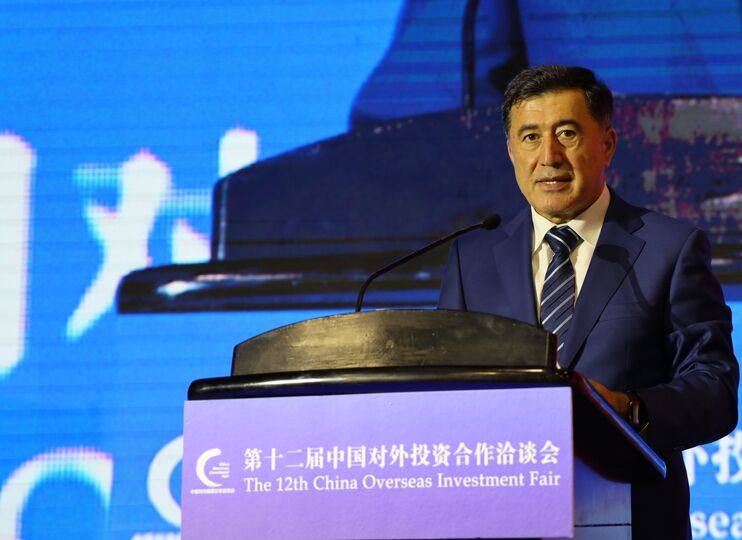On 25 November 2020, Beijing hosted the 12th China Overseas Investment Fair organised by the Administrative Committee of the China-SCO Demonstration Zone and the China Overseas Development Association (CODA).
The fair was attended by Chinese government officials, business people and representatives of the diplomatic corps and international agencies.
The key speakers were Deputy General Secretary of the National Commission for Development and Reforms Gao Gao; former Vice-Minister of the International Department of the CPC Central Committee Zhou Li; CODA Secretary General He Zhenwei; Deputy Director of the Administrative Committee of the China-SCO Demonstration Zone Meng Qingsheng; and Chief Operating Director of the China-Eurasian Economic Cooperation Fund (CEF) Rong Jian.
The Administrative Committee of the China-SCO Demonstration Zone and Hua No E San LLC (Beijing), a Russian trade company in China, signed a strategic cooperation agreement during the fair.
SCO Secretary-General Vladimir Norov took part in the event and spoke at the opening ceremony and the forum on the China-SCO Demonstration Zone's development.
He noted that the CODA-organised fair is a key event at which China gives effect to its foreign investment strategy.
"It is also an important international platform for developing cooperation between Chinese and foreign businesses, and searching for investment projects and business partners. It is a professional venue for discussing bilateral and multilateral investment cooperation, too. Owing to the development of investment partnership at the fair, in the past few years China has turned from a pure importer of foreign capital and investment into their exporter — now the amount of Chinese investment abroad and that of attracted funds is practically equal," said the SCO Secretary-General.
In this context, Mr Norov noted that China is the only large economy that showed 4.9 percent GDP growth in the third quarter of this year despite the ongoing pandemic. This is a tangible contribution to stabilising the global economy as well as the SCO economies that have been hard hit by the coronavirus pandemic.
Mr Norov pointed out that even in the difficult conditions of the COVID-19 pandemic, much has been done to strengthen the economic and humanitarian aspects of the SCO's activities as part of the priorities of Russia's SCO Presidency.
In particular, the Secretary-General said that the recent SCO Heads of State summit adopted a number of documents that enhance the role of the SCO as an effective venue for elaborating collective measures to overcome the epidemiological and socioeconomic impacts of the pandemic in the Shanghai Spirit. As part of Russia's Presidency, the SCO drafted and approved the updated Action Plan on implementing the SCO Development Strategy through 2025, which targets the earliest possible recovery of the member states' economies after the COVID-19 pandemic. Measures are being taken to further expand trade and economic cooperation, in part, by creating a favourable investment and business climate, supporting business initiatives, and implementing mutually beneficial projects.
The Secretary-General also said that the forthcoming meeting of the SCO Heads of Government Council on 30 November 2020 would endorse a five-year plan of measures on implementing the Programme of Multilateral Trade and Economic Cooperation of the SCO Member States until 2035. Under this plan, they will carry out programmes and projects using cutting-edge innovative and green technology. They will also ensure the transformation of their national economies by drafting SCO trade and investment rules, promoting the industry of services and e-trade, and simplifying commercial procedures.
In this context, Mr Norov highlighted the timeliness of the initiatives by President of China Xi Jinping on establishing the SCO Agricultural Technology Exchange and Training Demonstration Base on the basis of the Yangling Agricultural High-Tech Industries Demonstration Zone in Shaanxi Province and on creating the China-SCO regional trade and economic cooperation demonstration zone in the city of Qingdao.
The Secretary-General also informed the participants about the transfer of the SCO Presidency to Tajikistan. "Regarding priorities of economic cooperation, Tajikistan intends to focus on promoting cooperation in industrial production and energy, including renewable energy sources, and especially hydropower engineering. It will also concentrate on the development of effective mechanisms for the support of small and medium-sized businesses, the broad use of the transit advantages of the SCO space, the investment flow via the Business Council and the SCO Interbank Association in cooperation with international financial institutions, and the formation of a SCO specialised financial institution," Mr Norov noted.
The Secretary-General said the SCO is turning into a powerful trans-regional organisation, which is the best format for linking national strategies, cross-border projects and multilateral integration initiatives.
The fair participants spoke about China's successful socioeconomic progress on the basis of the new development model amid the pandemic threat. They noted the importance of the Belt and Road Initiative in facilitating further integration of the international community and expanding China's trade and economic cooperation with foreign countries. The participants emphasised that China would be willing to combine this initiative with the development strategies of other states and tailor it to the existing cooperation mechanisms. They gave assurances that China would continue cooperating with foreign partners to promote healthcare, medical aid coordination, international trade, investment, industrial infrastructure, transport and energy.
